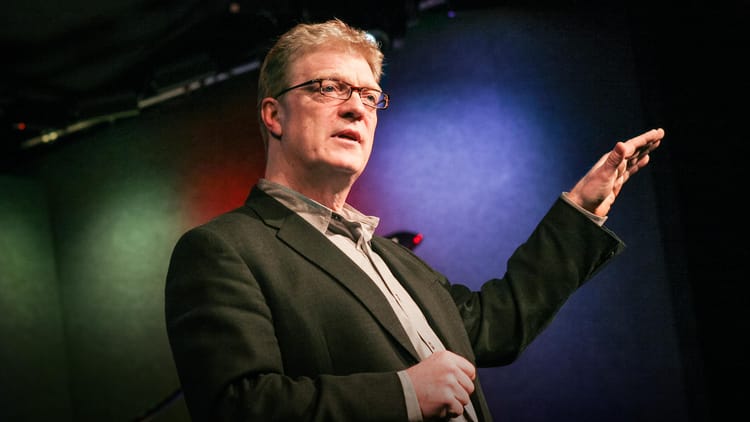“Do Schools Kill Creativity?” Sir Ken Robinson
• public
Table of contents
Sir Ken Robinson challenges the traditional education system and its impact on creativity. He argues that schools often stifle creativity and discourage students from pursuing their passions. Robinson advocates for a reform in education that values and nurtures creativity, recognizing its crucial role in fostering innovation and preparing students for a rapidly changing world.
For Key Ideas, Questions and Quotes from this talk, you can scroll below.
Sir Ken Robinson gave this speech at the TED Conference. All rights to the speech and the video above belong to TED.
About Sir Ken Robinson
Sir Ken Robinson was a British author, speaker and international advisor on education in the arts to government, non-profits, education and arts bodies. He was director of the Arts in Schools Project and Professor of Arts Education at the University of Warwick, and Professor Emeritus after leaving the university. (Source: Wikipedia)
Key Ideas From Talk
Ken's Ted talk was the funniest one I've ever watched. However, don't let the humor fool you. He touches on a very meaningful topic in a very entertaining way. That's why, if I had to recommend a Ted talk to someone who has never watched one, it would be Ken's.
So what is Ken talking about that is both entertaining and important? Education. Yes, the kind of boring education we all know. The system that we have been exposed to for years, which labels us, categorizes us as successful or unsuccessful, intelligent or unintelligent, etc. This system is shallow when compared to human capacity, uniqueness, and abilities.
Ken talks about why the current education system is the way it is and where it can evolve. After clearly stating the situation, he presents a solution. Although the talk is remarkable as a whole, the parts that impressed me the most were as follows:
- Creativity is as important as literacy: Robinson argues that our education systems prioritize literacy and numeracy over creativity, leading to a devaluation of creative abilities.
- Education stifles creativity: Robinson suggests that schools often discourage creativity by promoting conformity, standardized testing, and a focus on "right" answers, which can inhibit students' natural creative instincts.
- The need for diverse intelligence: Robinson emphasizes the importance of recognizing and nurturing diverse forms of intelligence beyond academic abilities, such as artistic, musical, and kinesthetic talents.
- The role of teachers: Robinson believes that teachers play a crucial role in fostering creativity by encouraging exploration, curiosity, and individual expression, rather than conforming to a rigid curriculum.
- Embracing mistakes and taking risks: Robinson highlights the importance of allowing students to make mistakes and take risks as part of the learning process, as it helps develop their creative problem-solving skills and resilience.
- Unleashing creativity for the future: Robinson emphasizes that in a rapidly changing world, nurturing creativity is essential for preparing students to navigate uncertain challenges and contribute to innovation and progress.
Questions to Ask Ourselves
- How has school and my upbringing affected my attitude towards creativity?
- Do I engage in activities that allow me to express my creativity? How does being creative affect my well-being?
- Has anyone ever discouraged me from being creative or made me feel bad about it? How did that experience affect me?
- Do I feel fulfilled and engaged when I engage in creative activities? If not, what is preventing me from doing so?
- Do I prioritize being intelligent and achieving good grades over being creative? How does this affect me emotionally?
- Are there any beliefs or thoughts that limit my ability to be creative? How can I challenge these beliefs and overcome these obstacles?
- Do I actively seek opportunities to improve my creative skills? How can I expand my knowledge and abilities in areas that interest me creatively?
Notes From Talk
Related List and Guide
This talk is a part of following list: "Talks That Changed My Perspective".
